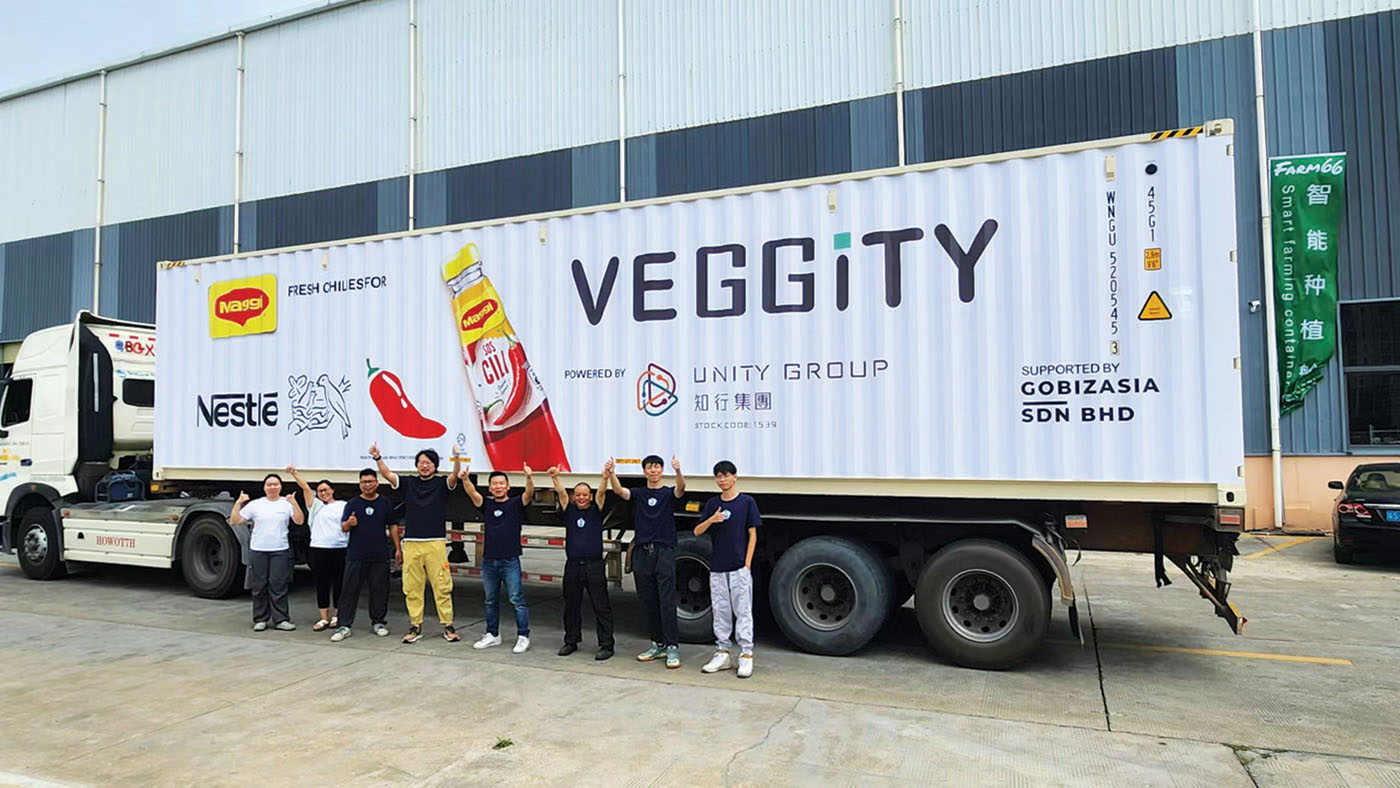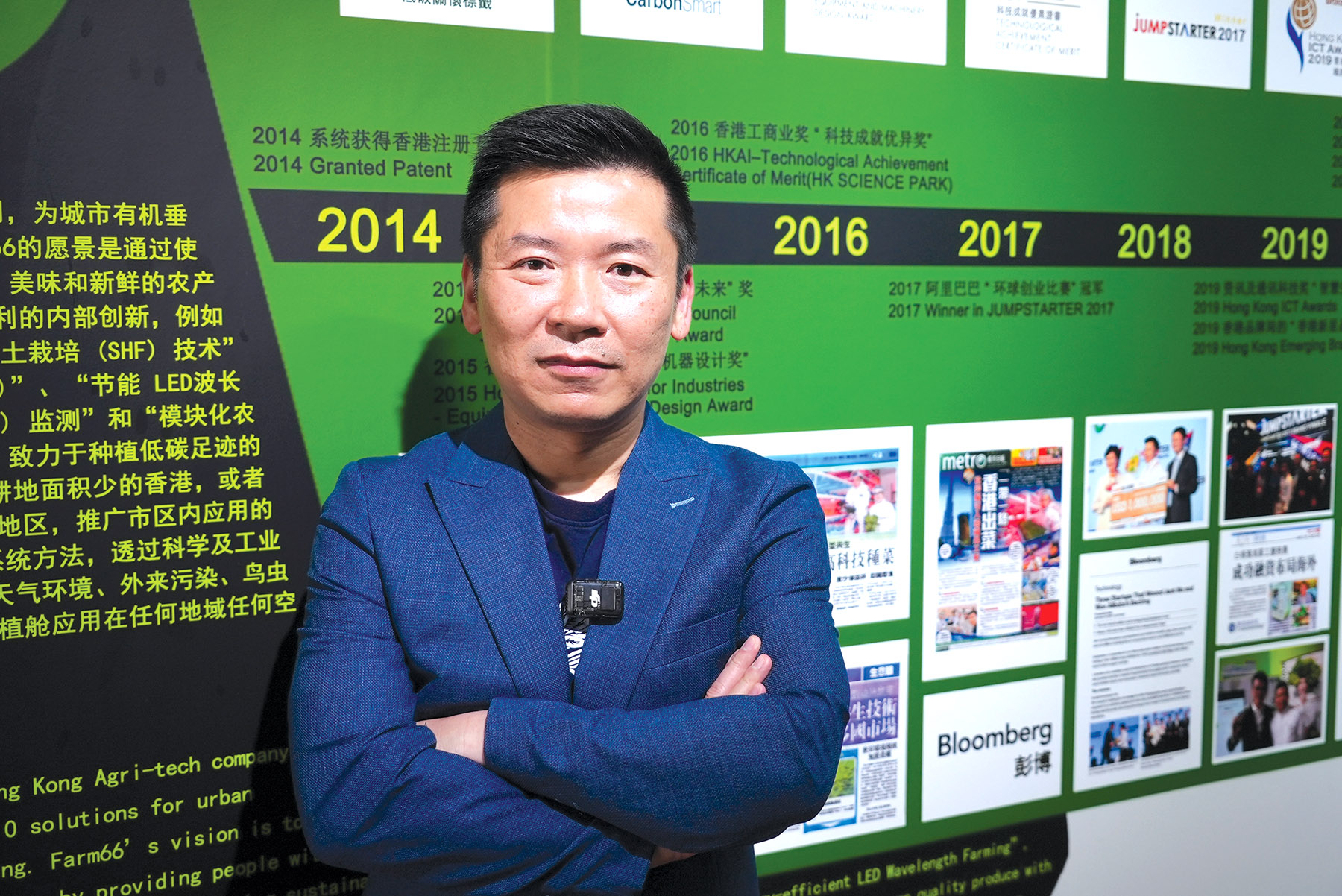High-tech vertical farms have found new ground on the Chinese mainland as the world grapples with supply disruptions brought about by adverse weather conditions. Li Bingcun reports from Dongguan.

Year-round produce — that’s what high-tech container farming offers on a planet whose food supply chains are constantly disrupted by climate change and natural calamities.
At a primitive factory in Dongguan, Guangdong province, modified shipping containers, or “mobile farms”, are filled with rows of shelves equipped with advanced technologies like hydroponic or aeroponic systems, to grow wasabi and chili peppers whose supplies are threatened by extreme weather in Japan and Malaysia.
A large digital screen remotely monitors a similar farm in Malaysia, allowing for real-time adjustments of temperature, humidity and other indicators.
The container farm in Dongguan marks the first step by Hong Kong agricultural technology firm, Farm66, to relocate its manufacturing operations to the Chinese mainland.
READ MORE: Agri-food trading center to start construction
A pioneer in vertical farming since its inception 12 years ago, the company last year shifted its production line to Dongguan — the “world’s factory” — that boasts a well-equipped supply chain of container assembly components, value-for-money factory options, top agricultural talents, and convenient transportation to Hong Kong.
The components for container farms’ automated operation can be delivered within one hour. Occupying over 2,000 square meters and located near Humen railway station — about an hour north from Hong Kong by high-speed train — the factory can accommodate up to 28 containers. It’s complemented by Humen Port’s lower export costs to overseas markets compared to Hong Kong.
To meet evolving market needs, Farm66 is considering establishing similar manufacturing bases in Zhuhai and Foshan within the Guangdong-Hong Kong-Macao Greater Bay Area, the Yangtze River Delta region, and Xinjiang Uygur autonomous region, says Gordon Tam, its founder and chief executive.
Sustainable solutions
Compared to traditional agriculture that relies heavily on weather conditions, vertical farming represents a facet of urban farming aimed at achieving more stable, efficient, fresh and environmentally-friendly food supply with technologies all year round.
The containers have six different planting systems tailored to growing products such as vegetables, mushrooms, forage and tall plants. Due to vertical farming, the planting efficiency of a single container is up to seven times that of conventional land farming. Each container achieves automated planting and can be remotely controlled to adjust environmental settings.
Farm66 has received large orders from Japan, Malaysia and the Middle East, with others expected to come from Canada, Thailand and Singapore. Agriculture in these regions is threatened by extreme weather, pollution, land shortage and adverse environments.
Wasabi and chili peppers are highly favored in Japan and Malaysia, but their cultivation demands stringent environmental conditions. In recent years, their production has declined due to prolonged rainfall, high temperatures and water pollution. Japan saw its wasabi production halved from 2012 to 2022.
Nestle Malaysia and a Japanese conglomerate have each ordered 50 container farms from Farm66 to ensure a stable supply of chili sauce and wasabi conservation.

Besides vegetables, forage projects are also promising as nutrients can be added to animals’ diet to improve digestion if they are fed with fresh pasture grass. “Not just horses — grass is also good for pigs and geese,” says Tam.
The entrepreneur is talking to horseracing organizations about supplying forage for hundreds of horses. Other potential clients include farms in Xinjiang that breed black-hair pigs known for their superior meat quality, as well as goose farmers in Fujian province.
The system’s applications aren’t confined to land. Farm66 is collaborating with a shipping company in Xiamen, Fujian province, to explore planting agricultural products on ships. In the long term, the company may team up with Hong Kong’s Kai Tak Cruise Terminal, offering cruise passengers fresh vegetables from its mobile farms.
Based on the movable farms, Farm66 has also cultivated products that are unsuitable for long-distance transportation, like edible flowers and colorful mushrooms, and researched growing high-value traditional Chinese medicine herbs and high quality fishery products.
In view of the mainland’s vibrant night economy and broadcasting industry, the firm aims to sell products that would appeal to night market consumers, and auction high-end products online in collaboration with internet celebrities.

Expansion plans
To expand its mainland market, Tam plans to bring down the costs of operating container farms currently priced at up to $50,000 each. He hopes to achieve sales of 10 million yuan ($1.38 million) this year, and double it in a few years before contemplating an initial public offering.
Due to restrictions on cross-boundary capital flow between Hong Kong and the mainland, Tam hopes to find a mainland investor to expand his operations.
A growing number of economies, including Hong Kong and other cities in the Greater Bay Area, attach great importance to urban agriculture by providing greater support for technologies, land, capital and policy guidance.
Hong Kong’s Blueprint for Sustainable Development of Agriculture and Fisheries, released in 2023, proposes to “integrate agriculture into urban lives” in the Northern Metropolis project, and aims to increase the city’s annual vegetable production fourfold in 15 years.
With a focus on sustainable urban development, Tam introduced hydroponic agriculture to revitalize industrial buildings and became a pioneer in urban farming when he founded Farm66 in 2013.
The company’s operation used to face regulatory obstacles as it changed the purpose of industrial buildings. Amid the backdrop of encouraging diversified farming, Tam convinced the authorities to amend the regulation after two years of negotiations, and hydroponic farming has been recognized for non-polluting industrial use.
ALSO READ: Dongguan's 'world factory' status evolving into high-tech, innovative future
After 12 years’ development, urban farming industry has witnessed the decline of early startups and an influx of newcomers. Farm66 has stayed competitive with comprehensive planting systems, advanced agricultural solutions, and a wealth of research data.
“Food supply is one of the world’s most critical issues. This is of paramount significance and offers a multitude of exploration possibilities,” Tam says.
With high hopes for urban farming, he cites projections that if a building the size of Hong Kong’s second-tallest skyscraper, 412-meter International Finance Centre, were to be used for vegetable cultivation, it could ensure a year-round supply for the entire city.
He says micro farms can offer a customized environment for plant growth, breaking geographical and climate restrictions. “For example, in a desert, we can create a French environment to grow lettuce, or replicate the climate of (China’s) Changbai Mountain to cultivate ginseng. This is what traditional agriculture can’t achieve.”
“For a long time, agriculture has been plagued by uncertainties. We hope to leverage technologies to enhance its stability, enabling farmers and investors to get predictable returns.”
Contact the writer at bingcun@chinadailyhk.com


